|
|
|
Sort Order |
|
|
|
Items / Page
|
|
|
|
|
|
|
| Srl | Item |
| 1 |
ID:
116112
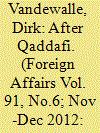

|
|
|
|
|
| Publication |
2012.
|
| Summary/Abstract |
The September 11 killing of the U.S. ambassador to Libya, Christopher Stevens, and three other Americans during an attack by an angry mob on the U.S. consulate in Benghazi has concentrated the world's attention on the problems of post-Qaddafi Libya. The riots showcased both the power of radical Islamist militias and the inability of the government in Tripoli to provide security and maintain order across the country. Lawlessness and corruption are pervasive, and fundamental questions about the structure and operation of Libyan political and economic institutions remain unanswered. None of this, however, should obscure the fact that the larger story about the new Libya is surprisingly positive. The worst-case scenarios commonly predicted a year ago have not emerged, and there are actually grounds for guarded optimism about the future.
|
|
|
|
|
|
|
|
|
|
|
|
|
|
|
|
| 2 |
ID:
104713
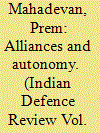

|
|
|
| 3 |
ID:
146687
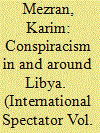

|
|
|
|
|
| Summary/Abstract |
The idea that there is one cohesive Islamist movement with a clearly defined plan to conquer power in Libya is a deeply flawed argument. It is one that, among other causes, is at the basis of the current divisions in the country and its civil strife. The Islamist movement in Libya, on the contrary, is a highly heterogeneous reality. Understanding this divisiveness is fundamental to the elaboration of a strategy for reunification and the establishment of law and order. Such a strategy should be based on the principle of incorporating those Islamists who accept the democratic process and isolating the more extremist ones.
|
|
|
|
|
|
|
|
|
|
|
|
|
|
|
|
| 4 |
ID:
114965
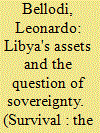

|
|
|
|
|
| Publication |
2012.
|
| Summary/Abstract |
In mid-February 2011, after popular revolts had overturned governments in Tunisia and Egypt, the so-called 'Arab Spring' reached the coasts of Libya. Protests against the decades-long rule of Colonel Muammar Gadhafi broke out in several Libyan cities and quickly gathered momentum, despite the efforts of the country's security forces to contain them. On 27 February, the leadership of the anti-Gadhafi movement, based in the eastern Libyan city of Benghazi, formed an interim National Transitional Council (NTC), which immediately declared itself the sole representative of the Libyan people. But although the uprisings in Tunisia and Egypt were quick and relatively bloodless, in Libya, the confrontation between Gadhafi's regime and the insurgents rapidly turned into an armed conflict.
|
|
|
|
|
|
|
|
|
|
|
|
|
|
|
|
| 5 |
ID:
116645
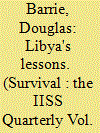

|
|
|
|
|
| Publication |
2012.
|
| Summary/Abstract |
After the Libyan regime of Colonel Muammar Gadhafi stepped up its military campaign against rebel forces in February and March 2011, in defiance of UN Security Council Resolution (UNSCR) 1970, pressure to impose a no-fly zone - which would require attacking the regime's air defences - began to mount. On 17 March, the Security Council, with China, Russia, Germany, Brazil and India abstaining, passed Resolution 1973 authorising nations to 'take all necessary measures … to protect civilians and civilian populated areas under threat of attack in the Libyan Arab Jamahiriya, including Benghazi, while excluding a foreign occupation force of any form on any part of Libyan territory'. It also imposed a no-fly zone across Libya, and authorised member states to take all necessary measures to enforce it. The resolution did not provide an explicit mandate to provide direct military aid to the rebels, which would probably have provoked a veto from Russia or China.
|
|
|
|
|
|
|
|
|
|
|
|
|
|
|
|
| 6 |
ID:
127266
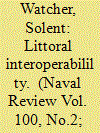

|
|
|
| 7 |
ID:
122087
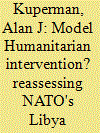

|
|
|
|
|
| Publication |
2013.
|
| Summary/Abstract |
NATO's 2011 humanitarian military intervention in Libya has been hailed as a model for implementing the emerging norm of the responsibility to protect (R2P), on grounds that it prevented an impending bloodbath in Benghazi and facilitated the ouster of Libya's oppressive ruler, Muammar al-Qaddafi, who had targeted peaceful civilian protesters. Before the international community embraces such conclusions, however, a more rigorous assessment of the net humanitarian impact of NATO intervention in Libya is warranted. The conventional narrative is flawed in its portrayal of both the nature of the violence in Libya prior to the intervention and NATO's eventual objective of regime change. An examination of the course of violence in Libya before and after NATO's action shows that the intervention backfired. The intervention extended the war's duration about sixfold; increased its death toll approximately seven to ten times; and exacerbated human rights abuses, humanitarian suffering, Islamic radicalism, and weapons proliferation in Libya and its neighbors. If it is a "model intervention," as senior NATO officials claim, it is a model of failure. Implementation of R2P must be reformed to address these unintended negative consequences and the dynamics underlying them. Only then will R2P be able to achieve its noble objectives.
|
|
|
|
|
|
|
|
|
|
|
|
|
|
|
|
| 8 |
ID:
039608
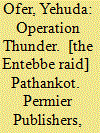

|
|
|
|
|
| Publication |
Pathankot, Permier Publishers, 1977.
|
| Description |
128p.hbk
|
|
|
|
|
|
|
|
|
|
|
|
Copies: C:1/I:0,R:0,Q:0
Circulation
| Accession# | Call# | Current Location | Status | Policy | Location |
| 016770 | 967.6104/OFE 016770 | Main | On Shelf | General | |
|
|
|
|
|
|
|
|
|